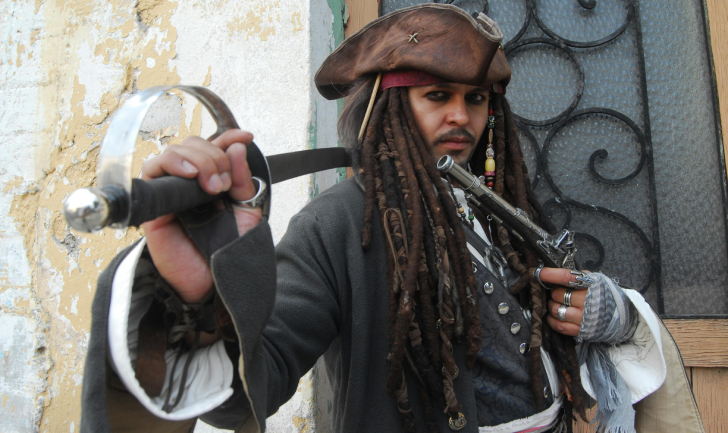Talk Like a Pirate Day
Talk Like a Pirate Day is celebrated annually on September 19th and is a fun, lighthearted observance encouraging people to speak in pirate slang and phrases. The day was created in 1995 by John Baur (also known as “Ol’ Chumbucket”) and Mark Summers (“Cap’n Slappy”) as a way to have fun and engage with the pirate theme. Talk Like a Pirate Day is a playful way to celebrate the lore and adventure of pirates, bringing out creativity and fun for participants of all ages!

Aortic Dissection Awareness Day
Aortic Dissection Awareness Day is observed on September 19th every year. It was founded in 2016 by Timo Söderlund, a survivor of Type A aortic dissection, and has grown into a global movement to raise awareness about this life-threatening condition. The day emphasizes education, early detection, and advocacy to reduce misdiagnosis and improve survival rates. Aortic dissection is a tear in the inner layer of the aorta, causing blood to flow between layers of the vessel wall. It’s often misdiagnosed because symptoms mimic other conditions. Mortality is high: Type A dissection has about a 2% mortality per hour in the first 24 hours; Type B can have up to 10% mortality over 30 days. In the UK and Ireland alone, over 2,000 people die annually from this condition.

Here are some notable historical events that occurred on September 19:
Significant Historical Events:
U.S. Coast Guard Established (1790):
The U.S. Coast Guard was established on September 19, 1790, as the Revenue Cutter Service, with the purpose of enforcing tariff and trade laws. It later merged with other maritime services to become the Coast Guard we know today.
First Performance of Beethoven’s Ninth Symphony (1824):
Ludwig van Beethoven’s Ninth Symphony, one of his most famous works, was performed for the first time in Vienna on September 19, 1824. This symphony is notable for its choral finale, featuring the “Ode to Joy” melody.
The Battle of the Alamo Begins (1835):
On September 19, 1835, Texian forces captured the Alamo mission in San Antonio from Mexican troops, marking a significant event in the Texas Revolution.
The First Use of the Word “Robot” (1920):
The term “robot” was first used in Karel Čapek’s play R.U.R. (Rossum’s Universal Robots), which premiered on September 19, 1920. The play introduced the concept of artificial beings created to serve humans.
The First International Conference on the Universal Declaration of Human Rights (1948):
On September 19, 1948, the United Nations held its first international conference focusing on the Universal Declaration of Human Rights, which would be adopted later that year.
The First Successful Transfusion of Blood (1667):
On September 19, 1667, the first known successful blood transfusion was performed by Jean-Baptiste Denis, a French physician, who transfused blood from a sheep into a human patient.
Significant Birthdays:
William Golding (1911–1993):
An English novelist, playwright, and poet, Golding is best known for his novel Lord of the Flies, which explores themes of human nature and civilization.
Jim Caviezel (1968–Present):
An American actor known for his roles in The Passion of the Christ and the TV series Person of Interest. He is recognized for his intense performances and has received critical acclaim for his work.
David McCullough (1933–2022):
An acclaimed American historian and author, McCullough wrote numerous bestsellers, including biographies of John Adams and Harry S. Truman. He received multiple Pulitzer Prizes for his contributions to literature and history.
Nicky Hilton (1983–Present):
An American socialite, businesswoman, and fashion designer. She is known for her work in the fashion industry and is a member of the famous Hilton family.
Travis Barker (1975–Present):
An American musician and songwriter, best known as the drummer for the rock band Blink-182. Barker has also collaborated with various artists across different genres.
Adam West (1928–2017):
An American actor best known for his portrayal of Batman in the 1960s television series Batman. He became an iconic figure in popular culture due to this role.
Ferdinand von Zeppelin (1838–1917):
A German general and aviation pioneer who founded the Zeppelin company and was instrumental in the development of rigid airships, known as zeppelins.
Significant Deaths:
William Howard Taft (1857–1930):
The 27th President of the United States, Taft served from 1909 to 1913. After his presidency, he became Chief Justice of the United States, making him the only person to have held both offices.
John McCormack (1884–1945):
An Irish-American tenor and politician, McCormack was known for his operatic performances and popular concerts. He also served as a member of the U.S. House of Representatives.
Hermann Hesse (1877–1962):
A German-Swiss poet, novelist, and painter, Hesse is best known for his novels Steppenwolf, Siddhartha, and The Glass Bead Game, which explore themes of self-discovery and spirituality.
Jesse Owens (1913–1980):
An American track and field athlete who gained fame at the 1936 Berlin Olympics, where he won four gold medals. Owens is remembered as a symbol of athletic excellence and a challenger to racial prejudice.
Admiral William D. Leahy (1875–1959):
A senior officer in the U.S. Navy who served as Chief of Staff to the Commander in Chief during World War II. He was also the first Chairman of the Joint Chiefs of Staff.
Bette Davis (1908–1989):
An iconic American actress known for her fierce performances in films like All About Eve and What Ever Happened to Baby Jane? Davis was a two-time Academy Award winner and a significant figure in Hollywood history.
Jimmy “The Greek” Snyder (1918–1996):
An American sports commentator and odds maker, Snyder was known for his contributions to sports betting and was a popular figure on television during the 1970s and 1980s.


